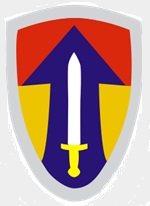Panzerkampf PZK12211PH US M42 "Duster" Self-Propelled Anti-Aircraft Gun - 5th Battalion, 2nd Field Artillery Regiment, II Field Force (1:72 Scale)
"The only way you can win a war is to attack and keep on attacking, and after you have done that, keep attacking some more."
- General George S. Patton Jr., January 1945
 The M42 40mm Self-Propelled Anti-Aircraft Gun, or "Duster," is an American armored light air-defense gun built for the United States Army from 1952 until December 1960, in service until 1988. Production of this vehicle was performed by the tank division of the General Motors Corporation. It used components from the M41 light tank and was constructed of all-welded steel.
The M42 40mm Self-Propelled Anti-Aircraft Gun, or "Duster," is an American armored light air-defense gun built for the United States Army from 1952 until December 1960, in service until 1988. Production of this vehicle was performed by the tank division of the General Motors Corporation. It used components from the M41 light tank and was constructed of all-welded steel.
A total of 3,700 M42s were built. The vehicle has a crew of six and weighs 22,500 kg (49,500 lb) fully loaded. Maximum speed is 45 mph (72 km/h) with a range of 100 miles (160 km). Armament consists of fully automatic twin 40 mm M2A1 Bofors, with a rate of fire of 2x120 rounds per minute (rpm) and either a .30 caliber Browning M1919A4 or 7.62mm M60 machine gun. The 500 hp, six-cylinder, Continental (or Lycoming engines), air-cooled, gasoline engine is located in the rear of the vehicle. It was driven by a cross-drive, two-speed Allison transmission.
Although the M42 Duster was initially designed for an anti-aircraft role, it proved to be highly effective against unarmored ground forces in the Vietnam war
Pictured here is a 1:72 scale replica of a US M42 "Duster" self-propelled anti-aircraft gun that was attached to 5th Battalion, 2nd Field Artillery Regiment, II Field Force.
Now in stock!
Dimensions:
Length: 4-inches
Width: 1-1/2-inches
Release Date: August 2022
 Historical Account: "II Field Force" - II Field Force, Vietnam was a United States Army Corps-level command during the Vietnam War. Activated on March 15th, 1966, it became the largest corps command in Vietnam and one of the largest in Army history. II Field Force was assigned the lineage of the XXII Corps, a World War II corps in the European Theater of Operations. II Field Force was a component of U.S. Military Assistance Command Vietnam (MACV) and had its headquarters in Long Binh.
Historical Account: "II Field Force" - II Field Force, Vietnam was a United States Army Corps-level command during the Vietnam War. Activated on March 15th, 1966, it became the largest corps command in Vietnam and one of the largest in Army history. II Field Force was assigned the lineage of the XXII Corps, a World War II corps in the European Theater of Operations. II Field Force was a component of U.S. Military Assistance Command Vietnam (MACV) and had its headquarters in Long Binh.
II Field Force's area of responsibility was III Corps Tactical Zone, later renamed Military Region 3, which comprised eleven provinces surrounding Saigon. This was designed to mimic the ARVN III Corps region. II Field Force controlled units participating in the 1968 Tet Offensive and the 1970 Cambodian Incursion.
II Field Force was inactivated on May 2nd, 1971, during the withdrawal of U.S. ground combat forces from Vietnam, with its assets providing the basis for its successor, Third Regional Assistance Command (TRAC).




